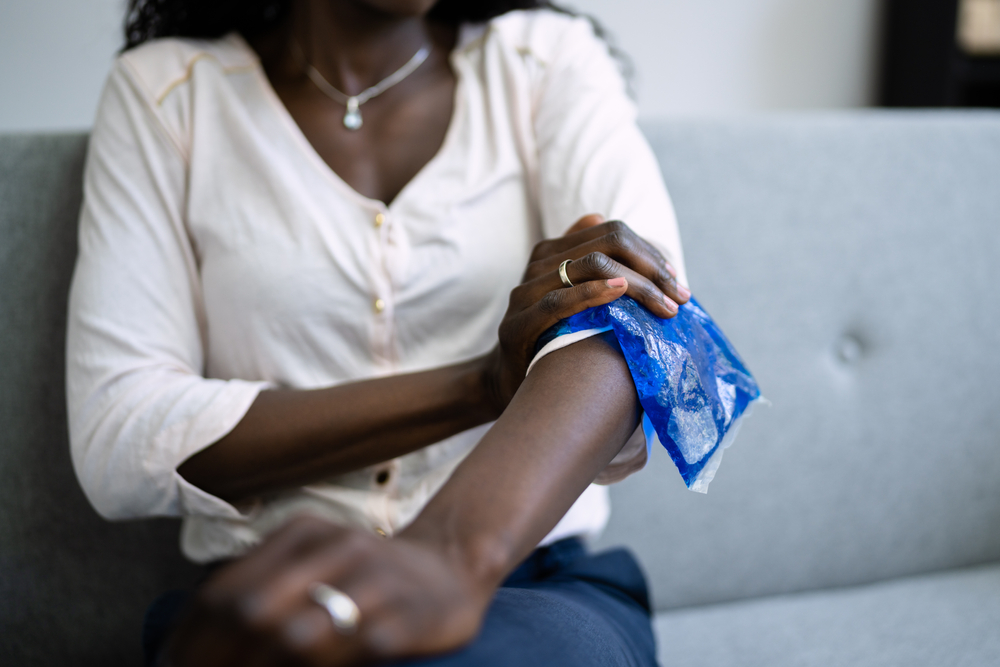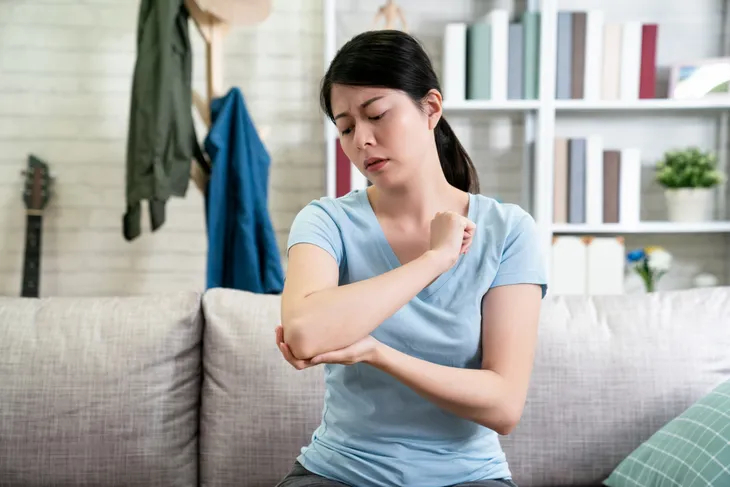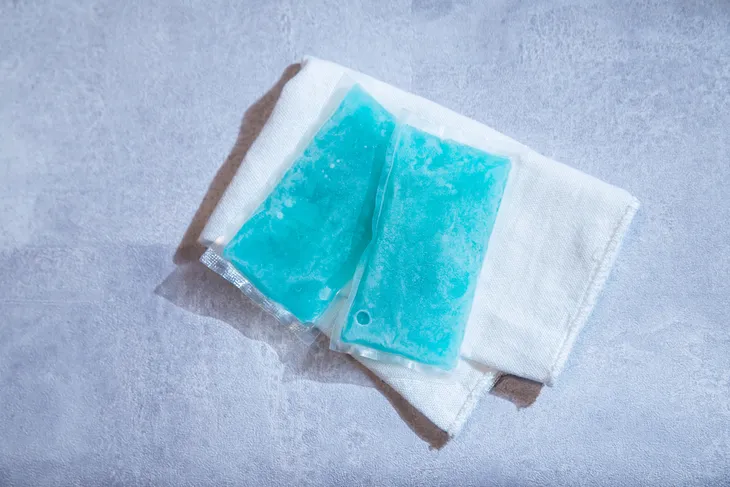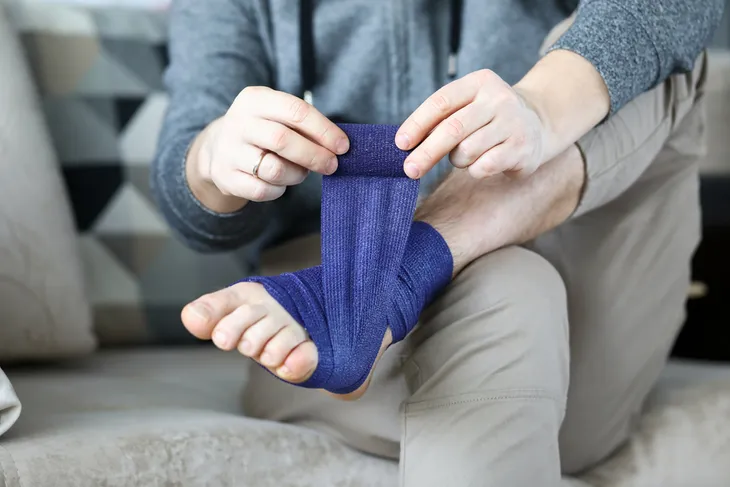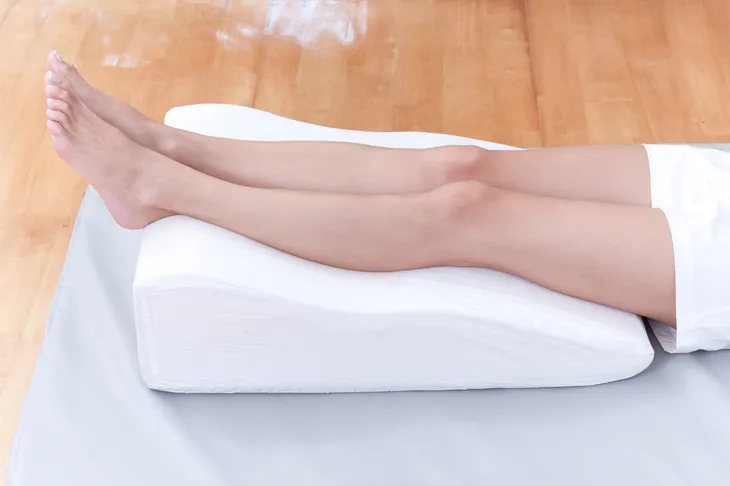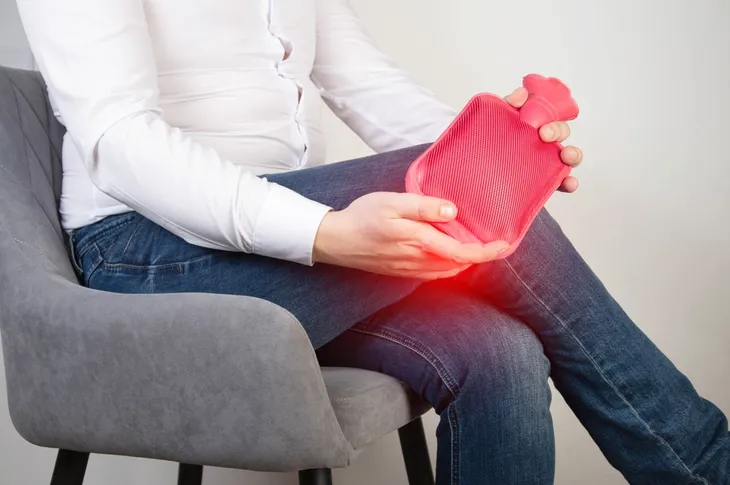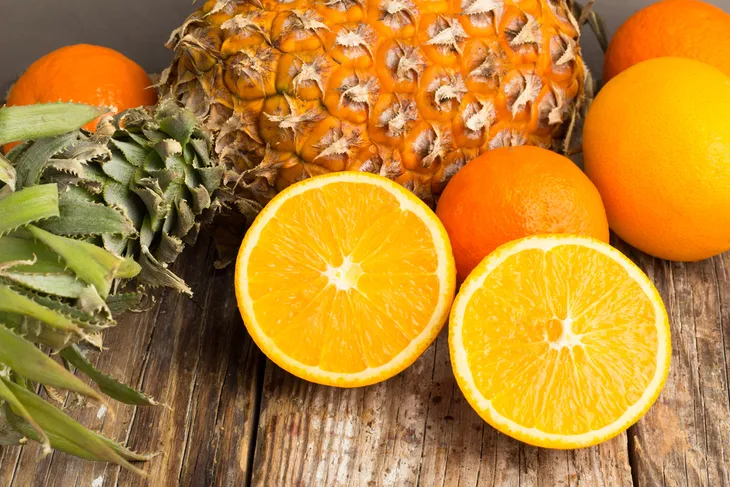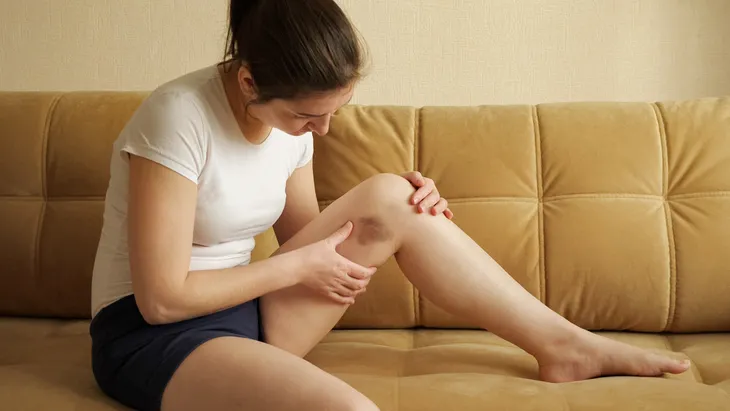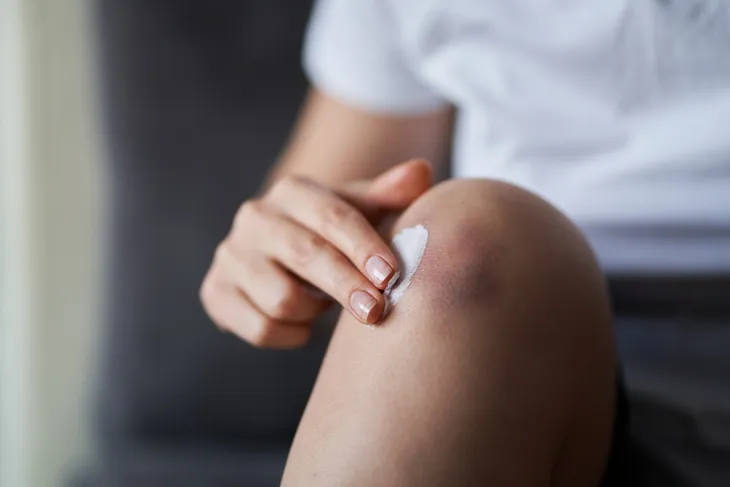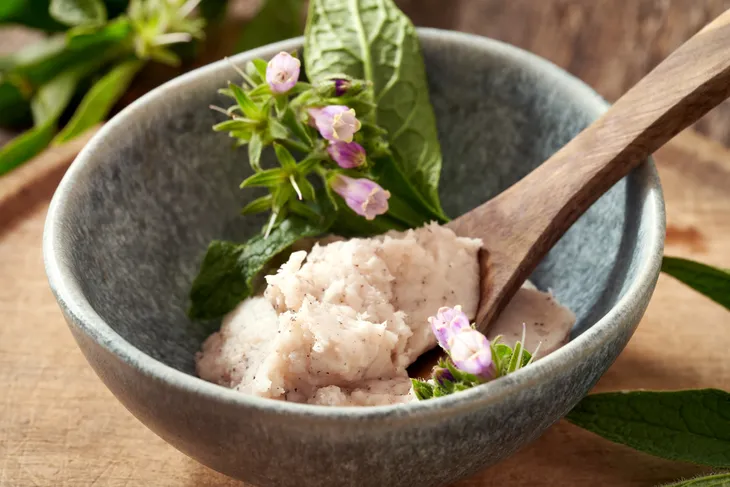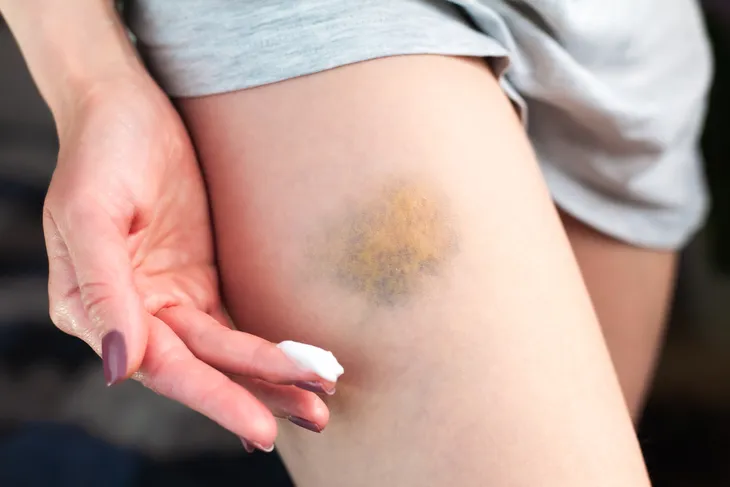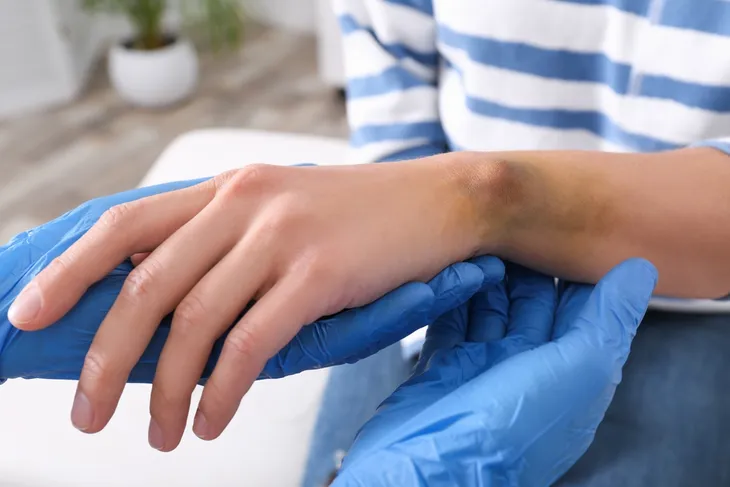- At the first sign of injury, get off your feet and ice the affected area.
- After the first 2-days, switch from ice to a heating pad or warm compress.
- Creams and gels with arnica or Vitamin K can also help fade bruises.
Even though bruises typically aren’t a serious health concern, they can be annoying. After all, they discolor the affected area of your skin and can be tender to the touch. While bruises usually heal on their own after a couple of weeks, some home remedies may help speed up the process.
Here are 10 home remedies for fading bruises. Plus, practical advice for preventing them in the first place!
Rest
When you first get injured, stop what you’re doing and get off your feet — even if you don’t see bruising yet. Pain is your body’s way of telling you that something is wrong. Powering through can wind up delaying recovery time and leave a lingering bruise for longer.
The Cleveland Clinic says resting is essential because it can help prevent swelling and alleviate pain. While recovery time varies by person and injury, WebMD recommends staying off your feet as much as possible for the first 2-days.
Ice
Icing the bruise is another thing you can do to help speed up healing. According to Verywell Fit, cold contact “works to limit swelling by reducing the overall amount of blood flow to the injured area of the body.” The Cleveland Clinic says bruises happen when blood pools under the skin, so less blood flow can lead to less severe bruising.
Before applying ice to the affected area, wrap it in a towel. WebMD suggests icing the area for about 15-minutes every few hours during the first 2-days. If you don’t have ice on hand, no problem. You can swap ice for a bag of frozen vegetables. Just remember to wrap it in a towel so you don’t directly expose your skin to freezing temperatures.
Compression
Compression is also a useful home remedy to use during the first 2-days. “When you put pressure on an injured area,” Insider explains, “it can decrease swelling and prevent the injured blood vessels from leaking.” As a result, compression can help reduce the severity of the bruising.
WebMD recommends wrapping the injured area with a medical bandage. When you put on the bandage, make sure it’s snug but comfortable. “If the skin below the wrap turns blue or feels cold, numb, or tingly,” the source says to “loosen the bandage.” Seek medical help if those symptoms don’t go away promptly.
Elevation
Whenever possible, elevating the injured area can also make a difference. Insider says that’s because “gravity will pull the blood down, away from the wound.” So, it’s another method to help control blood flow to the area and limit swelling.
Verywell Fit says, “Elevating is most effective when the injured area of the body is raised above heart level.” While that isn’t possible for all injuries, it can be easily accomplished in some instances. Take leg injuries, for example. You can lie back and use pillows to prop up your leg.
Heat
After the first 2-days, swap your ice pack for a heating pad or warm compress. Applying heat can boost circulation and increase blood flow, which is helpful at this point. Healthline says both things can help “clear away the trapped blood after the bruise has already formed.”
Insider recommends applying heat for 10- to 15-minutes several times a day. The heating pad or warm compress should be comfortably warm — in other words, not too hot. Alternatively, you can soak in a warm bath instead.
Bruise-Healing Food
Adding certain foods to your diet can also help heal bruises. Medical News Today explains that some foods can “strengthen the body’s blood vessels” and keep skin tissue “strong and pliable.”
So, what do they recommend eating? More bromelain, quercetin, flavonoids, vitamin K, lean protein, and zinc. Here are some specific foods to consider adding to your diet to help limit bruising:
- Pineapple (bromelain)
- Apples (quercetin)
- Oranges (flavonoids)
- Kale (vitamin K)
- Salmon (lean protein)
- Legumes (zinc)
Don’t Massage It
The bruised area might feel sore but resist the urge to massage it. Massaging or touching the area more than necessary can lead to a larger bruise. WebMD says that’s because you may accidentally “break more blood vessels under the skin.”
Instead, manage the pain with other methods. Ice should help during the first 2-days, and heat should help after that. Additionally, treatment can include over-the-counter pain relievers. The source says pain should start subsiding 3-days after you got bruised.
Arnica Ointment
Arnica is a herb known for its ability to help reduce inflammation and swelling. So, it’s another remedy for getting rid of a bruise. In fact, a 2010 study found that participants who topically applied 20-percent arnica ointment saw a greater improvement in their bruises than the control group that used a placebo.
“When applied topically,” Well+Good says arnica “stimulates circulation to kick your body’s own healing process into high gear, helping to fade your bruise faster.” Arnica ointments can be found at drugstores. Healthline suggests applying arnica to the bruised area a few times a day.
Comfrey Ointment
Comfrey is another natural remedy to consider — but run it by your doctor first. It’s a perennial shrub that Mount Sinai says contains allantoin and other substances that can help new skin cells grow and reduce inflammation. For this reason, comfrey ointments can help heal bruises.
The source warns against using comfrey ointments on broken skin, so avoid it if a cut accompanies your bruise. It also says comfrey should only be used topically for up to 10-days at a time. If your doctor says you can use comfrey, then they can provide guidance about how often to use it per day.
Topical Vitamin K
Much like how adding more vitamin K to your diet may help heal bruises, Medical News Today says topical vitamin K “shows some promise as a remedy for bruises.” The source references a 2009 study that found participants who used a vitamin K gel had less bruising after a cosmetic procedure than those who used a placebo.
Drugstores and beauty departments offer several types of topical vitamin K products. For example, many brands make vitamin K creams, gels, and serums. Once you select a topical vitamin K product, apply it to the bruised area as often as directed by the company.
When to See a Doctor
You can’t magically make a bruise disappear overnight, but using some combination of these home remedies can help speed up the healing process. That said, it can still take a couple of weeks for a bruise to fade away completely. While bruises typically aren’t a serious health concern, you should keep an eye on how long your bruise takes to heal.
The Cleveland Clinic says you should see a doctor if you:
- Still have the bruise after 2-weeks
- Develop a lump over the bruise
- Experience painful swelling
- Still feel pain a few days later
- Notice blood in urine or stool
- Experience unexplained bruising
Preventing Bruises
You can’t always avoid getting a bruise, but you can take preventative measures to lower your risk. For one thing, it’s a good idea to eliminate tripping hazards around your home like area rugs and clutter. Tidying up can help prevent falling, which can help you avoid bruising in the first place.
Beyond that, it can also help to protect yourself when doing something that could result in injury. Examples include wearing a helmet and pads when riding a bike or playing sports. Certain vitamin deficiencies like vitamin K and taking blood thinners can also make you more prone to bruising. However, talk to a doctor before overhauling your diet.
